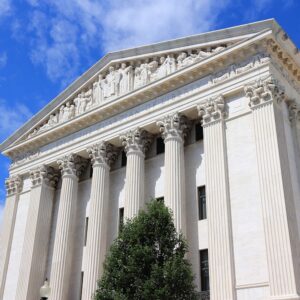The Supreme Court is expected to face a test of its collective character soon. In Trump v. Anderson, the court is faced with a hard choice — jurisprudence or politics.
Donald Trump wants to be on the Colorado ballot for president in 2024. Our Constitution prohibits those who took the oath and engaged in insurgency or rebellion from holding civilian or military office again.
Trump’s guilt in engaging in insurrection may come down to how insurrection is defined. It’s generally not defined under federal law, but some web research turned up a meaning for the crime in the U.S. legal code — US Code 10 Section 253.
In the context of a wider explanation of insurrection and “domestic disturbance,” it is defined as behavior that hinders the execution of state or federal law, depriving citizens of a right, privilege, immunity, or protection named in the Constitution.
Insurrection and domestic disturbance apparently occur when officials are unable, fail or refuse to protect those rights, privileges, immunities or protections. Or when officials oppose or obstruct the execution of the laws of the United States or impede the course of justice under those laws.
The storming of the U.S. Capitol on January 6, 2021, and President Trump’s inaction prevented the execution of federal election law. The congressional approval of the official vote tally was impeded, and the democratic will of the people of the republic was definitely hindered. The Supreme Court will decide the issue.
The justices are cloaked in neutral-black robes, and they toil under the blinded gaze of Lady Justice, but they can be as biased and as conflicted as the rest of us.
The justices drew the short straw in deciding whether the former president is eligible for the presidency — but that’s what they signed on for. The rest of us signed on to comply with their decision.
They have options — obfuscate and pass the buck, determine the case after Trump is convicted or acquitted, and use that lower decision to determine their definition of insurrection. In essence, that would make a common American jury our Supreme Court. They can favor the interpretation defined in US Code 10 Section 253. Or they can decide Trump’s action and inaction on and around January 6, 2021, don’t meet a new definition of insurrection that they provide.
Character and capability will be revealed in the legal, logical, reasonable and conscionable content of their individual opinions and their prevailing decision. Every American will see that through their own lens and have opinions to express.
The justices of the past lived very unique lives. On March 6, 1857, Roger Taney decided Dred Scott was then, and always had been, a slave. Chief Justice Taney was the brother-in-law of the man who created the anthem of the “land of the free.” However, that sentiment had not rubbed off on Taney’s interpretation of all people of color’s rights. In the following 10 years, Dred Scott and millions of Americans of color remained slaves, and 700,000 Americans died until their blood — and Abraham Lincoln’s conscience — rewrote the decision.
Other justices were less momentous but no less memorable. According to the Supreme Court Society Quarterly publication of the summer of 1981, Sandra Day O’Connor, the first female justice, was raised on a “Bonanza” size ranch in the West where she repaired fences and rode horses.
Justice Potter Stewart was nominated by President Dwight Eisenhower. Deciding on obscenity, he famously said, “I know it when I see it.” At age 65 and as concise as ever, he retired, saying, “It was better to go too soon than to stay too long.”
Our justices, steeped in the law and wearing long robes, are only human. Just as another American lawyer — President John Adams, who wrote that America should have a “government of laws, not of men.” Sworn to serve both, who will our Supreme Court choose?
It is hoped they will know the truth of insurrection when they see it, and an honest lens will define that perception. A good decision, as always, will determine our future as a union. And maybe even dour Lady Justice will stifle a smile. Her scales are waiting.


